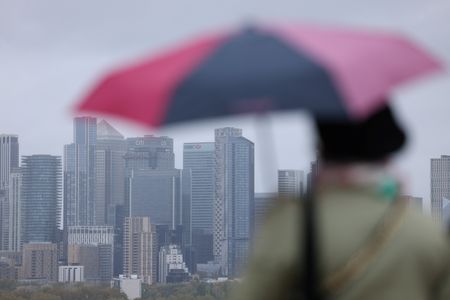By William Schomberg and Tommy Reggiori Wilkes
LONDON (Reuters) -British bank shares fell sharply on Friday after a think-tank called for a new levy on lenders and a newspaper report said industry figures were worried the government was planning to raise cash by targeting the sector.
Finance minister Rachel Reeves should use her autumn budget to tax banks on the billions of pounds they receive in interest from the Bank of England on reserves held at the central bank, the Institute for Public Policy Research recommended.
Around 22 billion pounds ($29.7 billion) a year, which goes to the banks as a result of the BoE’s bond-buying programme, represents a subsidy to the lenders, the think-tank said.
Echoing calls made by other commentators in recent years, the IPPR said a new tax on the interest the banks received would give Reeves more room to meet her fiscal rules.
Reeves is widely expected to increase taxes again, after raising them on employers in her first budget last year, as a subdued growth outlook and higher borrowing costs put pressure on Britain’s public finances.
“What started as a programme to boost the economy is now a massive drain on taxpayer money,” Carsten Jung, associate director for economic policy at IPPR, said.
British bank shares were the worst performers among the STOXX 600 index of large European companies after the Financial Times said fears were growing in the industry that Reeves would target banks.
NatWest dropped 5.1% and Lloyds 4.9% by 1030 GMT. Barclays sank 4% against a FTSE 100 down 0.3%. Their shares have enjoyed a huge rally since early 2024 as higher rates boosted profitability.
“In the last couple of years, the Chancellor has been protective of the banks and has avoided raising taxes,” analysts at Exane told clients. “However, public finances may require additional cash and pressures for a bank tax from within the Labour party seem to be rising.”
A spokesperson for Britain’s finance ministry said the best way to strengthen public finances was to speed up economic growth.
“Changes to tax and spend policy are not the only ways of doing this, as seen with our planning reforms,” the spokesperson said.
TAX OPTIONS
British media have published reports recently on tax increase options for Reeves, ranging from a new levy on home sales and increasing taxes on landlords to freezing the thresholds at which individuals pay income tax and changes to tax relief on pensions.
British banks hold hundreds of billions of pounds of reserves at the BoE, largely as a result of its quantitative easing – or bond-buying – that was launched during the 2008-09 global financial crisis and is now being run down.
Banks are paid interest on reserves at the BoE’s benchmark rate, which is higher now than during the QE programme. BoE losses are covered by the Treasury and, ultimately, taxpayers.
BoE Governor Andrew Bailey has said the system was essential to transmit changes in official interest rates to the economy.
In June, Bailey again defended the programme after it came under fire from some politicians for its cost.
In May, Bailey and Reeves raised the prospect of the BoE making money from its new system for providing reserves to banks after racking up huge losses from its bond-buying programme.
Industry group UK Finance said banks paid almost 45 billion pounds in tax last year. Another tax would “make the UK less internationally competitive and run counter to the government’s aim of supporting the financial services sector” to boost growth, a spokesperson said.
Calls for a rethink of the system date back years. Former BoE deputy governor Paul Tucker said in 2022 the government should review it. ($1 = 0.7402 pounds)
(Writing by William Schomberg; Editing by Kate Holton and Alex Richardson)









